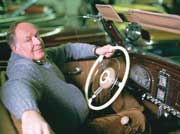 “Across the country, shopping became a complicated and often frustrating experience. Even with coupons for rationed goods and the patience to wait in long lines, there was never quite enough to go around. Everyday items were now hard to come by—laundry soap, facial tissue, cotton diapers, thumbtacks and even hair curlers.
“Across the country, shopping became a complicated and often frustrating experience. Even with coupons for rationed goods and the patience to wait in long lines, there was never quite enough to go around. Everyday items were now hard to come by—laundry soap, facial tissue, cotton diapers, thumbtacks and even hair curlers.
Nylon had ‘gone to war,’ and women went back to stockings of rayon and cotton. The annoyance of such shortages was compounded by the great amount of money in the pockets of U.S. consumers– $90 billion more in 1944 than at the time of Pearl Harbor.
Most Americans at home, however, fortified their patience, drew on old Yankee ingenuity and made do. Month after month they waited, praying for good news of family members overseas. In the meantime, they patched up aging cars, drove slower and shared rides. Housewives uses saccharin and corn syrup instead of sugar and stretched meats with all sorts of casseroles. Smokers revived the ‘roll-your-own’ cigarette, and coffee drinkers rebrewed grounds. In general, spirits remained high. Homefront sacrifices stirred a sense of duty. And besides, victory was coming.” WWII, Time-Life Books, 1989
Sure as shootin’! Americans were so united in their commitment to defeating the evil Axis powers and fascism that they radically changed their driving habits and drank recycled coffee. They scrounged for tacks without much grousing. Cut down on sugar for goodness sake. Yes, all that and much more. The Greatest Generation at its greatest would do whatever it took, wherever it took them.
Fast forward 70 years. There is a nearly universal consensus now that we live in a fractured nation. Red states, blue states, some purple ones too. Real news, fake news, often too much news. We appear to disagree on nearly everything (within the intricate controversies of healthcare, is that one reason why dozens if not hundreds of toothpastes are available?) and stand ready to do battle nearly as readily with ourselves as with serious external threats.
News media giant Dan Rather, now 85, recently shared some interesting views of where the country we still love has gone over the years. “We are a deeply divided country,” he noted. “The digital divide, the divide about fear of the future, but also a general divide between the haves and the have nots. People in the technology sector are perceived to be among the haves.”While Americans continue to revere technology, many worry openly about how automation and globalization impact jobs. In one recent survey, half the respondents were concerned about the pace of innovation.
Rather feels that people’s fear of the future only widen our divisions.
“I believe this is rooted in the increasing fear that many in the general public share of being left behind. First we had the beginning of the digital divide in the late ’80s or early ’90s,” Rather said. “Now when they look toward the future, such things like the robotization of America that’s coming right down the line, their fears are exacerbated.”
It is indeed a potentially scary, rapidly shifting world out there. Has it ever been otherwise, or does it just seem that way as we reminisce about calm and stability while gazing in the rear view mirror? As I continue to harken back to the Greatest Generation and the nearly unfathomable challenges that they faced, it seems increasingly clear that shared sacrifice and mutual giving played a huge role in keeping society glued together. This notion struck me again recently as we watched “Manchester by the Sea,” the acclaimed film about struggling janitor Lee Chandler (played brilliantly by Casey Affleck) with identity and self-control issues [and maybe a few too many beers and bar fights]. Chandler regains his emotional balance—not without some major speed bumps along the way—when he reluctantly agrees to serve as guardian for his teen nephew Patrick. Lee and Patrick continue to wrestle with self-confidence, dependency and adolescent angst issues but their mutual love, support and sacrifice begin to uplift them through family and economic challenges.
Reader’s Digest has long advocated in a popular feature that laughter is the best medicine and they’re far more right than wrong about that. But don’t we have to add giving and self-denial, even in small doses, to that psychological first aid kit? I mentioned recently that I’ve happily taken to feeding feral cats locally. It felt even better recently after I received a response from the postal service about my mangled package, intended as a small gift to my brother in Connecticut. A form letter from the Atlanta Mail Recovery Center, hand signed by one “J. Conn,” informed me that (surprise!) the once enclosed articles were not found. The envelope I received was sent to J. Conn at my address. Huh? Yep, our tax dollars at work. At least I know åfor sure where my cat food dollars are going and it just feels great.






